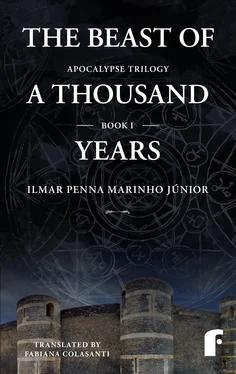“I’ll tell you this, baby: he was going to stay for a weekend, and he stayed a month. He had to go back to Belgium, but he didn’t even stay for two months there. He left his wife, left everything behind, and came back to be with me. He came to live here for good, and a year later my little nuisance was born.”
“Did you know he was coming back? You were sure of it, weren’t you?”
“Baby, I prayed every night to Saint Thérèse of the Child Jesus. When he left, he told me in his best “Brazilian”: ‘I’ll come back, I’ll protect our love, because I’ve learned at the waterfell that the souls are only soulmates if they have the same heart.’ You know, baby, I love my Belgian king like I’ve loved him from the first day.”
“King? Where did that come from?” exclaimed Júlia.
Mother and daughter laughed and hugged, moved.
“I just hope you find someone who makes you a queen.”
“Here in this Godforsaken place? Not even by a miracle”
“It’s not the place that matters. It’s the line of fate that is written on our hands and the stars. You’ll eventually find him, wherever he is, my love. Have faith in this.”
“Then help me, Mom, so I don’t have to run away from here.”
“Don’t even think about that. You’re still my little girl.”
“Little girl? Mom, I’m already twenty-years-old. It’s time to live in Rio,” she argued, wiggling the stem of her eyeglasses with the tip of her fingers. “I can’t stand being in Mauá any longer.”
“Aren’t you happy here with us?”
“Of course I am, very much so. But I don’t have a future here, Mom. I want to go to college. Work in a newspaper. Have my life as a woman. Talk to him, Mom. I can’t listen to other people’s stories anymore. I want to write my own story.”
“I’ll try, my love. Things are not that simple. No one can open your father’s thick skull. I’ll plot something, baby. I’ll grab the Belgian by the stomach on his birthday. You’ll see.”
Maria Tereza was not laughing anymore. Her daughter could go away any minute now, without permission. She knew that her daughter’s absence from the inn would open a painful wound in her father’s heart. But she couldn’t disappoint Júlia. Time had come not to frustrate her dream of being a journalist in Rio de Janeiro and find love. Saddened and resigned, she asked herself: How could Júlia follow her destiny if she didn’t help her a bit, huh?
*
“Wonderful! Wonderful!” repeated the king’s friends.
Maria Tereza had prepared a dinner worthy of the Ordre des Agathopédes, a famous Belgian gastronomic coterie. In the art and the pleasure of good cuisine, she had outdone herself with the quiche royale, accompanied by a green salad and fruit rouges, as a first course; the roasted boar with marron glacé and potatoes au gratin, and the dessert, never served before. They even had the tasty bleu de Bresse cheese1, which her husband loved and that now was also being produced in Minas Gerais, where mornings and nights were usually cold, and the pastures were rich in nutrients, like in the Rhône-Alpes region, where Bresse is located.
When the lights in the room were out and he went to blow the candles on the cake, the birthday boy began to cry copiously. And it was no wonder. The cake had the colors of the Walloon flag, red and yellow around the lit volcano, with incandescent, molten bleu lava. Baldo didn’t feel guilty for accepting several pieces of the cake. Chef Maria let him and his Belgian friends who lived in Rio have seconds and thirds of the delicious dessert. The next morning, solemnly, like King Leopold III, who had to renounce his throne in 1951 in favor of his son Baudoin, father Baldo, although grumpy and upset, finally allowed his daughter to travel in search of her destiny.
The vigorous mountain dweller did not resist the celebrations and, for the first time in many, many years, fell ill. Perhaps it was too much emotion for a quiet Belgian, or just for a father who was heartbroken by the terrifying event of his beloved daughter leaving the Blue Angel Inn for the very first time.
“Go, baby girl, take Saint Thérèse of the Child Jesus’s medal. I asked your father to bring me one if he decided to come to live here. Keep it, my love, to light your path,” said Maria Tereza, very moved, crying while she said goodbye and put her daughter on a bus and the medal around her neck.
Her father was so emotional he could barely speak.
“Remember the first words in French that I taught you? From the first scene in the book Tintin in the Land of the Soviets?”
“Of course I remember, Dad. It was bon voyage. You made me repeat the word voyage a thousand times, until I got the pronunciation right.”
“Then I wish you bon voyage, my love, and stay away from violence,” her father whispered, looking crestfallen, as if he had not had much sleep and had had a piece of his heart ripped off at a single stroke.
It wasn’t easy for Júlia to leave Mauá. To leave behind her childhood of rag dolls, animals and woods, her teenage years of many books, memories of laughing, happy, bouncy times in the flowery gardens of the inn. To stop having her father’s company, who had encouraged her to see the world. Maybe if she hadn’t read so many stories and had so many conversations with so many guests she wouldn’t have this urge to venture out in a big city and be a reporter like the fearless Tintin.
“What did you tell him, Mom, to let me go?”
Her mother told her about the terrible argument. He didn’t want to let her leave Mauá at all. He got to the point of screaming. He only lowered his voice when she challenged him to answer something like this:
“Don’t you understand, you stubborn man, that Mauá has become too small for her? Do you want your daughter to be miserable for the rest of her life? Do you want your daughter to get old without finding the destiny of happiness as a woman as she deserves? You’ll never forgive yourself for this cruelty. When I met you, right after you came from Belgium to be happy here, you weren’t that selfish.”
1. A sort of blue cheese produced in the region of Bresse, France (N.R.)
Chapter 6
AURÉLIEN KLÉBER, SON OF A FRENCH SOLDIER, during all his childhood and teenage years had to follow his father’s footsteps on all displacements on French territory. Although le petit continuously reinvented his love for the French soul and culture, these constant travels, in which he got acquainted with cities and people, in time became a burden because of the frequency in which they were made. He had to change schools several times. At each return, Aurélien would complain about not being able to keep the memories from the places and the people. He gained life experience, but the images and memories were so fleeting that they had faded in an invisible chamber.
“It’s just a matter of adapting,” his father François would sum up to justify the changing of houses, cities, and temperatures.
His maternal grandparents would always protest, in discontent:
“Why the hell can’t the boy have a permanent home, friends, and a normal education in Strasbourg?”
“No and no!” hollered the father, zealous, and, more than that, stubborn on giving continuity to the military tradition of his family.
The concern of his grandfather Jean-Philippe, known as Jojo for his lovable bulldog face, and his grandmother Michelle, a sexagenarian marathon runner, didn’t matter.
“You don’t understand. It’s le petit that worries us.”
“What about him?” his mother Dominique would ask.
“He’ll have to attend a different school? Poor boy!” the grandmother would say in anguish, distraught by her grandson’s wails.
“Well, Mom, he’s big enough to know that this is the way it has to be. Think on the positive side. He must be enjoying meeting new friends and the change of scenery. To have adventures to tell!” praised the mother, still young and happy with the nomadic life, not realizing how much the travels and changing schools bothered le petit. He was always huffing in a bad mood, outraged at each transfer.
Читать дальше












